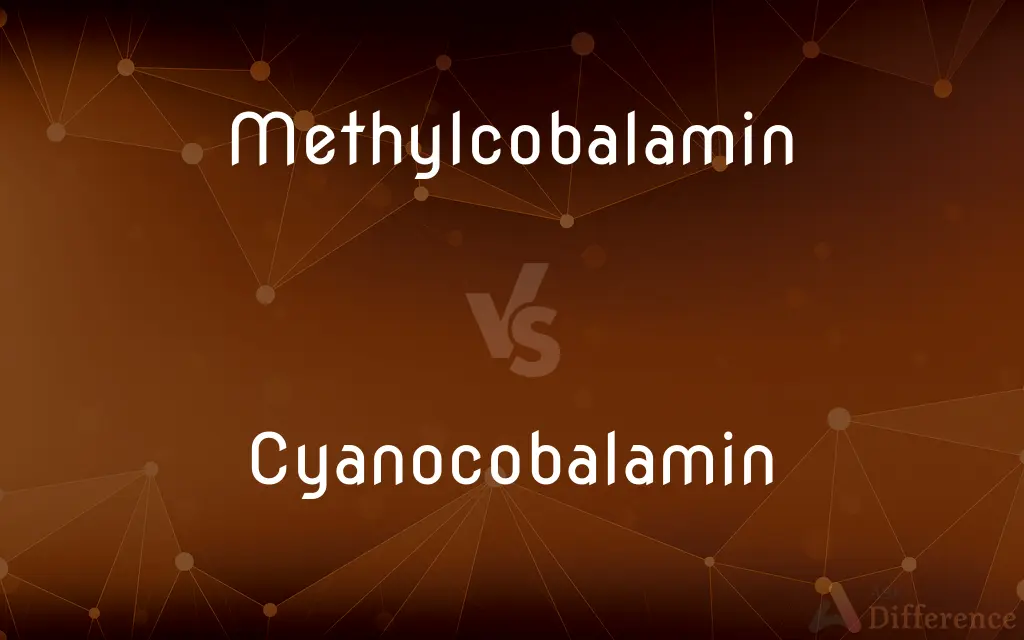Methylcobalamin vs. Cyanocobalamin — What's the Difference?
Edited by Tayyaba Rehman — By Fiza Rafique — Published on July 13, 2024
Methylcobalamin is a natural form of vitamin B12 used directly by the body, while Cyanocobalamin is a synthetic, cheaper form that requires conversion to be utilized.

Difference Between Methylcobalamin and Cyanocobalamin
Table of Contents
ADVERTISEMENT
Key Differences
Methylcobalamin is the natural form of vitamin B12 found in food, readily absorbed and utilized by the body, particularly beneficial for nerve health and methylation processes. On the other hand, Cyanocobalamin, a synthetic version, contains a cyanide molecule and must be converted by the body into a usable form, either methylcobalamin or adenosylcobalamin, before it can be utilized effectively.
While Methylcobalamin is retained in the body for a longer period and directly supports brain health, sleep quality, and provides a boost in energy, Cyanocobalamin tends to be cheaper and more stable, making it a common choice for supplements and fortified foods. However, its conversion process does require the body to expend a small amount of energy to remove the cyanide molecule.
The effectiveness of Methylcobalamin is often highlighted for individuals with specific genetic variations that affect B12 absorption and utilization, making it a preferred choice for those requiring supplementation. Cyanocobalamin, although widely used, may not be as efficient for those with impaired kidney function due to the need to remove and process the cyanide component.
In terms of supplementation, Methylcobalamin is often recommended for its immediate bioavailability and support for neurological function. Conversely, Cyanocobalamin, while effective in increasing B12 levels, may not provide the same level of support for neurological health or be as suitable for individuals with certain health conditions.
Comparison Chart
Form
Natural
Synthetic
ADVERTISEMENT
Absorption
Directly utilized by the body
Requires conversion to active forms
Health Benefits
Supports nerve health, brain function, and energy
Effective for general B12 deficiency treatment
Stability
Less stable, requiring careful storage
More stable, suitable for supplements
Cost
Generally more expensive
Less expensive
Suitability
Preferred for neurological health and those with absorption issues
Widely used, but may require caution in kidney impairment
Conversion in Body
No conversion needed
Must be converted, involving a cyanide molecule
Retention
Better retained in the body
Less retention until converted
Recommended For
Individuals needing immediate B12 utilization
Cost-effective supplementation
Compare with Definitions
Methylcobalamin
Supports brain health and sleep quality.
Since starting methylcobalamin, my sleep and memory have improved.
Cyanocobalamin
A synthetic, stable form of vitamin B12 used in supplements.
Most B12 supplements contain cyanocobalamin due to its stability.
Methylcobalamin
Directly utilized by the body, enhancing energy and methylation.
Taking methylcobalamin has improved my energy levels.
Cyanocobalamin
Requires conversion by the body to become active.
My body has to convert cyanocobalamin into a usable form of B12.
Methylcobalamin
More expensive but effective for immediate B12 needs.
Despite its cost, methylcobalamin is worth it for my neurological health.
Cyanocobalamin
Cost-effective option for addressing B12 deficiency.
I chose cyanocobalamin for its affordability and effectiveness.
Methylcobalamin
A natural, bioavailable form of vitamin B12 supporting nerve health.
Methylcobalamin supplements are often recommended for neuropathy.
Cyanocobalamin
Widely used in fortified foods and supplements.
Many vegan products are fortified with cyanocobalamin to ensure adequate B12 intake.
Methylcobalamin
Ideal for individuals with specific genetic variations affecting B12 utilization.
Due to my genetic makeup, methylcobalamin is the best choice for me.
Cyanocobalamin
Contains a cyanide molecule, necessitating caution in kidney impairment.
My doctor recommended avoiding cyanocobalamin due to my kidney condition.
Methylcobalamin
A cobalamin (form of vitamin B12) used to treat neuropathies.
Cyanocobalamin
(vitamin) A synthetic form of vitamin B12 (cobalamin).
Cyanocobalamin
A B vitamin that is used to treat pernicious anemia
Common Curiosities
What is the main difference between Methylcobalamin and Cyanocobalamin?
Methylcobalamin is a natural form directly utilized by the body, whereas Cyanocobalamin is synthetic and requires conversion to be used.
Is Cyanocobalamin safe for everyone?
While generally safe, it may require caution for those with kidney impairment due to the cyanide molecule that must be processed.
Is Methylcobalamin more expensive than Cyanocobalamin?
Yes, methylcobalamin is generally more expensive due to its natural form and higher absorption rate.
Why might someone choose Methylcobalamin over Cyanocobalamin?
For its immediate bioavailability, especially for neurological health or in cases of specific genetic variations affecting B12 absorption.
Which form of B12 is better for energy levels?
Methylcobalamin is often preferred for boosting energy due to its direct utilization by the body.
Is Methylcobalamin suitable for vegetarians and vegans?
Yes, it's an excellent choice for vegetarians and vegans needing to supplement their B12 intake.
Can Cyanocobalamin effectively treat B12 deficiency?
Yes, it can effectively increase B12 levels, although it may not offer the same level of support for neurological conditions as methylcobalamin.
Can Cyanocobalamin be used in fortified foods?
Yes, it's commonly used in fortified foods due to its stability and cost-effectiveness.
How does the body process Cyanocobalamin?
The body must remove the cyanide molecule and convert Cyanocobalamin into methylcobalamin or adenosylcobalamin to utilize it.
Are there any side effects associated with Methylcobalamin?
It is generally well-tolerated, but as with any supplement, some individuals may experience side effects.
How do I know which form of B12 I should take?
Consulting with a healthcare provider can help determine the best form based on your health needs and conditions.
Why is Methylcobalamin recommended for neurological health?
Its direct bioavailability supports nerve health, brain function, and can improve sleep quality.
Does Cyanocobalamin have any advantages over Methylcobalamin?
Its advantages include lower cost, longer shelf life, and stability in supplements.
Share Your Discovery

Previous Comparison
Windows Application vs. Web Application
Next Comparison
Prokaryotic DNA vs. Eukaryotic DNAAuthor Spotlight
Written by
Fiza RafiqueFiza Rafique is a skilled content writer at AskDifference.com, where she meticulously refines and enhances written pieces. Drawing from her vast editorial expertise, Fiza ensures clarity, accuracy, and precision in every article. Passionate about language, she continually seeks to elevate the quality of content for readers worldwide.
Edited by
Tayyaba RehmanTayyaba Rehman is a distinguished writer, currently serving as a primary contributor to askdifference.com. As a researcher in semantics and etymology, Tayyaba's passion for the complexity of languages and their distinctions has found a perfect home on the platform. Tayyaba delves into the intricacies of language, distinguishing between commonly confused words and phrases, thereby providing clarity for readers worldwide.














































